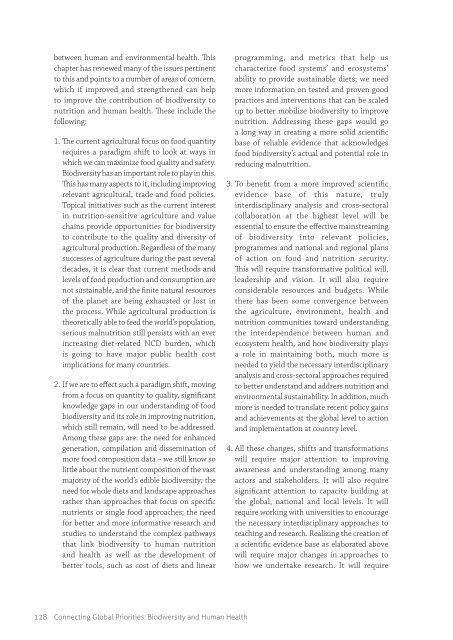Connecting Global Priorities Biodiversity and Human Health
1ZcgwtN
1ZcgwtN
Create successful ePaper yourself
Turn your PDF publications into a flip-book with our unique Google optimized e-Paper software.
etween human <strong>and</strong> environmental health. This<br />
chapter has reviewed many of the issues pertinent<br />
to this <strong>and</strong> points to a number of areas of concern,<br />
which if improved <strong>and</strong> strengthened can help<br />
to improve the contribution of biodiversity to<br />
nutrition <strong>and</strong> human health. These include the<br />
following:<br />
1. The current agricultural focus on food quantity<br />
requires a paradigm shift to look at ways in<br />
which we can maximize food quality <strong>and</strong> safety.<br />
<strong>Biodiversity</strong> has an important role to play in this.<br />
This has many aspects to it, including improving<br />
relevant agricultural, trade <strong>and</strong> food policies.<br />
Topical initiatives such as the current interest<br />
in nutrition-sensitive agriculture <strong>and</strong> value<br />
chains provide opportunities for biodiversity<br />
to contribute to the quality <strong>and</strong> diversity of<br />
agricultural production. Regardless of the many<br />
successes of agriculture during the past several<br />
decades, it is clear that current methods <strong>and</strong><br />
levels of food production <strong>and</strong> consumption are<br />
not sustainable, <strong>and</strong> the finite natural resources<br />
of the planet are being exhausted or lost in<br />
the process. While agricultural production is<br />
theoretically able to feed the world’s population,<br />
serious malnutrition still persists with an ever<br />
increasing diet-related NCD burden, which<br />
is going to have major public health cost<br />
implications for many countries.<br />
2. If we are to effect such a paradigm shift, moving<br />
from a focus on quantity to quality, significant<br />
knowledge gaps in our underst<strong>and</strong>ing of food<br />
biodiversity <strong>and</strong> its role in improving nutrition,<br />
which still remain, will need to be addressed.<br />
Among these gaps are: the need for enhanced<br />
generation, compilation <strong>and</strong> dissemination of<br />
more food composition data – we still know so<br />
little about the nutrient composition of the vast<br />
majority of the world’s edible biodiversity; the<br />
need for whole diets <strong>and</strong> l<strong>and</strong>scape approaches<br />
rather than approaches that focus on specific<br />
nutrients or single food approaches; the need<br />
for better <strong>and</strong> more informative research <strong>and</strong><br />
studies to underst<strong>and</strong> the complex pathways<br />
that link biodiversity to human nutrition<br />
<strong>and</strong> health as well as the development of<br />
better tools, such as cost of diets <strong>and</strong> linear<br />
programming, <strong>and</strong> metrics that help us<br />
characterize food systems’ <strong>and</strong> ecosystems’<br />
ability to provide sustainable diets; we need<br />
more information on tested <strong>and</strong> proven good<br />
practices <strong>and</strong> interventions that can be scaled<br />
up to better mobilize biodiversity to improve<br />
nutrition. Addressing these gaps would go<br />
a long way in creating a more solid scientific<br />
base of reliable evidence that acknowledges<br />
food biodiversity’s actual <strong>and</strong> potential role in<br />
reducing malnutrition.<br />
3. To benefit from a more improved scientific<br />
evidence base of this nature, truly<br />
interdisciplinary analysis <strong>and</strong> cross-sectoral<br />
collaboration at the highest level will be<br />
essential to ensure the effective mainstreaming<br />
of biodiversity into relevant policies,<br />
programmes <strong>and</strong> national <strong>and</strong> regional plans<br />
of action on food <strong>and</strong> nutrition security.<br />
This will require transformative political will,<br />
leadership <strong>and</strong> vision. It will also require<br />
considerable resources <strong>and</strong> budgets. While<br />
there has been some convergence between<br />
the agriculture, environment, health <strong>and</strong><br />
nutrition communities toward underst<strong>and</strong>ing<br />
the interdependence between human <strong>and</strong><br />
ecosystem health, <strong>and</strong> how biodiversity plays<br />
a role in maintaining both, much more is<br />
needed to yield the necessary interdisciplinary<br />
analysis <strong>and</strong> cross-sectoral approaches required<br />
to better underst<strong>and</strong> <strong>and</strong> address nutrition <strong>and</strong><br />
environmental sustainability. In addition, much<br />
more is needed to translate recent policy gains<br />
<strong>and</strong> achievements at the global level to action<br />
<strong>and</strong> implementation at country level.<br />
4. All these changes, shifts <strong>and</strong> transformations<br />
will require major attention to improving<br />
awareness <strong>and</strong> underst<strong>and</strong>ing among many<br />
actors <strong>and</strong> stakeholders. It will also require<br />
significant attention to capacity building at<br />
the global, national <strong>and</strong> local levels. It will<br />
require working with universities to encourage<br />
the necessary interdisciplinary approaches to<br />
teaching <strong>and</strong> research. Realizing the creation of<br />
a scientific evidence base as elaborated above<br />
will require major changes in approaches to<br />
how we undertake research. It will require<br />
128 <strong>Connecting</strong> <strong>Global</strong> <strong>Priorities</strong>: <strong>Biodiversity</strong> <strong>and</strong> <strong>Human</strong> <strong>Health</strong>


